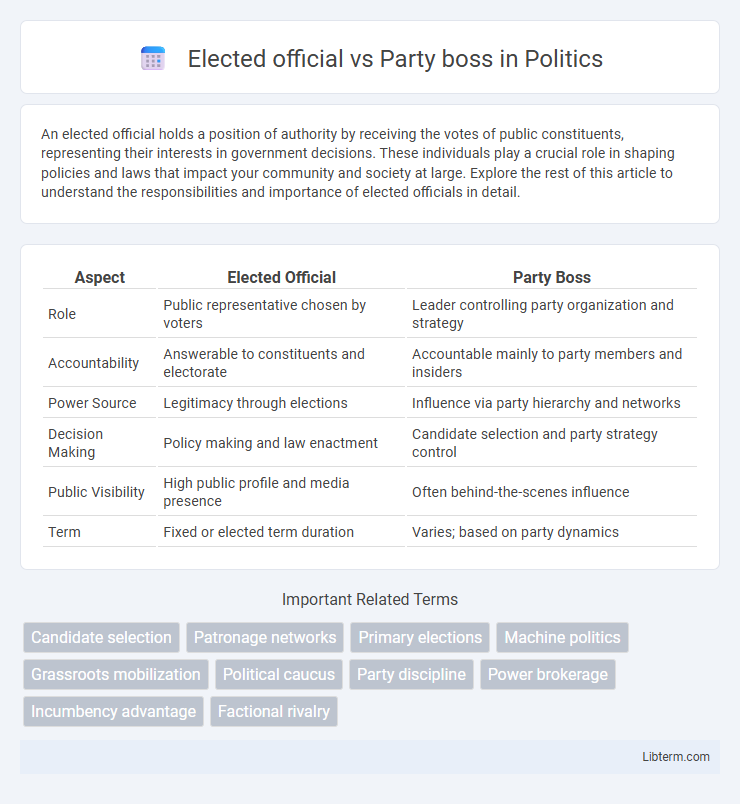An elected official holds a position of authority by receiving the votes of public constituents, representing their interests in government decisions. These individuals play a crucial role in shaping policies and laws that impact your community and society at large. Explore the rest of this article to understand the responsibilities and importance of elected officials in detail.
Table of Comparison
| Aspect | Elected Official | Party Boss |
|---|---|---|
| Role | Public representative chosen by voters | Leader controlling party organization and strategy |
| Accountability | Answerable to constituents and electorate | Accountable mainly to party members and insiders |
| Power Source | Legitimacy through elections | Influence via party hierarchy and networks |
| Decision Making | Policy making and law enactment | Candidate selection and party strategy control |
| Public Visibility | High public profile and media presence | Often behind-the-scenes influence |
| Term | Fixed or elected term duration | Varies; based on party dynamics |
Defining Elected Officials and Party Bosses
Elected officials hold public offices through democratic elections, representing constituents in government and making policy decisions based on legal mandates and voter interests. Party bosses control political party operations and candidate selections, often wielding influence through organizational power and patronage rather than direct electoral authority. The distinction lies in elected officials' accountability to voters versus party bosses' behind-the-scenes political maneuvering within party structures.
Historical Evolution of Political Roles
Elected officials have historically gained legitimacy through popular votes and democratic processes, evolving from local representatives to powerful national leaders in modern political systems. Party bosses emerged prominently in the late 19th and early 20th centuries, wielding significant influence behind the scenes by controlling party machinery, candidate nominations, and voter mobilization efforts. Over time, reforms such as primary elections and anti-corruption laws diminished the dominance of party bosses, emphasizing transparency and accountability in political roles.
Key Responsibilities and Powers
Elected officials hold formal authority granted through democratic elections, responsible for creating laws, setting policies, and representing constituents' interests within governmental institutions. Party bosses wield informal but significant power within political parties by controlling candidate selection, mobilizing voter bases, and influencing party strategies and patronage networks. The distinction lies in elected officials' public accountability and legislative duties versus party bosses' behind-the-scenes influence over party organization and political careers.
Influence on Policy and Governance
Elected officials possess formal authority to enact policies through legislative or executive roles, directly shaping governance based on public mandates and legal frameworks. Party bosses exert influence by controlling party resources, candidate selections, and strategic direction, thereby indirectly affecting policy decisions and government priorities. The balance of power between elected officials and party bosses often determines the effectiveness and ideological orientation of policy implementation.
Methods of Gaining and Maintaining Power
Elected officials gain power primarily through democratic elections, relying on voter support, campaign strategies, and public approval to secure and maintain their positions. Party bosses consolidate and sustain power through control over party machinery, patronage systems, and influence in candidate selection, often leveraging behind-the-scenes negotiation and loyalty networks. While elected officials depend on formal electoral mandates, party bosses emphasize informal authority and organizational dominance within political parties.
Relationship with Voters and the Public
Elected officials maintain direct accountability to voters through regular elections, public appearances, and constituent services, ensuring their actions reflect public interests and community needs. Party bosses wield influence primarily within political organizations, relying on control over party machinery and endorsements rather than direct voter engagement. This distinction impacts their relationship with the public: elected officials seek voter approval to sustain their legitimacy, while party bosses operate behind the scenes, shaping candidate selections and party platforms without direct public mandates.
Impact on Political Parties
Elected officials shape political parties by representing constituents' interests and influencing policy decisions, often prioritizing public accountability and voter approval. Party bosses wield control over party organization, candidate selection, and resource distribution, impacting party cohesion and strategic direction. The dynamic tension between elected officials and party bosses affects party unity, electoral success, and the balance of power within political organizations.
Accountability and Transparency Issues
Elected officials are directly accountable to voters through regular elections, ensuring greater transparency in decision-making and public policy implementation. Party bosses often operate behind closed doors, wielding significant influence over political appointments and candidate selections without direct voter oversight. This lack of transparency in party boss operations can lead to issues such as corruption, patronage, and reduced public trust in the political system.
Controversies and Case Studies
Elected officials often face controversies related to transparency and accountability, as seen in cases like the corruption scandals involving former Illinois Governor Rod Blagojevich. Party bosses, such as Boss Tweed of Tammany Hall, are historically notorious for manipulating political power through patronage and vote-buying, leading to widespread political corruption. Case studies highlight that while elected officials are publicly scrutinized through legal frameworks, party bosses frequently operate behind the scenes, complicating efforts to enforce ethical governance.
The Future of Political Leadership
Elected officials, accountable to constituents through democratic processes, embody transparency and public trust, shaping policy with direct voter influence. Party bosses, wielding centralized power within political organizations, often direct candidate selection and strategic decisions behind closed doors, impacting party cohesion and electoral outcomes. The future of political leadership will likely balance increasing demands for participatory democracy with the enduring influence of party structures in mobilizing support and maintaining governance stability.
Elected official Infographic

 libterm.com
libterm.com